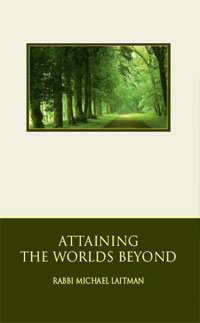The First Step of Spiritual Development
There are two consecutive stages of correcting egoism. The first stage is not to use it at all, but to think and act only with the desire to “give,” without any thought to possible gain from the results of one’s actions. When we are capable of acting in such a way, we then proceed to the second stage: we begin to gradually employ our egoism by gradually incorporating it into our altruistic actions and thoughts, thereby correcting it.
For example, a person gives away everything to others, without getting anything back in return; this is the first step of development. If one is truly able to act in this way in all cases, then, in order to be able to give even more, the rich will provide this individual with even more.
Riches will thus pass through that individual in order to be given away to others. The amount of wealth that will be received from others will depend on whether one can give away everything that was received without being tempted by such bounty. In such a case, egoism will be employed for a noble cause: the more one receives, the more will be given away. But can one give away everything?
The amount of wealth passing through one’s hands determines the level of one’s correction.
The 2 Contradicting Forms of Altruism
The first stage is known as “the correction of creation” (of egoism), and the second stage is known as “the goal of creation,” or one’s ability to use egoism in altruistic actions, for altruistic goals.
Kabbalah centers on these two stages of spiritual development. However, the desires and pleasures mentioned in Kabbalah are billions of times greater than all the pleasures of our world combined.
These two steps are also in constant conflict with one another, because the first completely rejects the use of egoism and its correction, while the second uses it in small quantities, determined by the strength of one’s ability to counteract it for one’s correction. Thus, the actions in these two conditions are opposite to one another, even though both are altruistic in purpose.
Even in our world, an individual who gives away everything is opposite in action to the one who receives, even in order to give away. In this light, many of the contradictions and conflicts depicted in the Bible become more understandable.
Drawn towards the Seemingly Unattainable Truth
After a period of undertaking intense work on ourselves, learning and striving for spiritual perception, we will feel a desire to see some results. It will seem that, after all the work we have done (especially compared with the work done by others around us) we have earned the right to experience the Revelation of the Creator, to see a clear manifestation of the spiritual laws we studied so ardently, and to perceive the pleasures of the spiritual worlds.
In reality, however, all things appear to be exactly opposite to our expectations: we might feel that we are regressing, rather than progressing, in comparison to others who do not study Kabbalah. We might feel that instead of perceiving the Creator, and instead of the Creator hearkening to us, that we are moving farther and farther away from the Creator.
Moreover, the increasing hiatus from spiritual achievements and our lowering of spiritual aspirations would appear to be the direct result of our studies. Thus, a legitimate question arises: looking at those studying the Bible in a simple, ordinary manner, we can see that they come to feel their superiority over others, while we who study Kabbalah grow more discontented, seeing how much worse we have become in our desires and thoughts, and how much further away we have moved from the good spiritual desires which led us to Kabbalah in the first place!
Perhaps it would be better not to start engaging in the study of Kabbalah at all! Maybe all the time devoted to these studies will be spent in vain! On the other hand, we may already feel that only here can we find the truth and the answers to the questions within us.
This feeling only adds to the building pressure: we cannot abandon Kabbalah because it is the truth, but we seem to have nothing in common with it and, thus, we are moving further away from it, with the perception that our desires are much lower than those of our contemporaries.
Becoming Worthy of the Spiritual Worlds
However, in essence, these emotions are experienced only by those who are in the process of true spiritual work on themselves, rather than by those who merely pore over the study of Bible, only to learn its simple meanings and to keep the commandments.
This is because those who aspire to ascend will strive to attain a spiritual state in which all personal aspirations, thoughts, and desires are devoid of personal interests. For this purpose, the quintessence of one’s true thoughts and motivations is revealed from Above.
We can prove that we can endure our testing after having gone through suffering, having found within ourselves the enormity of our egoism, and having seen the great distance between the self and even the most insignificant spiritual quality. We will prove ourselves worthy of glimpsing the spiritual worlds, however, if we can still, in spite of everything we have endured, silence the heart, and express love for the Creator without demanding a reward for one’s efforts and suffering.
And if, despite all that has been endured, these conditions are dearer than animal pleasures and tranquility.
 “Oh the Spiritual Worlds You Will See!” is based on the book, Attaining the Worlds Beyond by Dr. Michael Laitman.
“Oh the Spiritual Worlds You Will See!” is based on the book, Attaining the Worlds Beyond by Dr. Michael Laitman.

